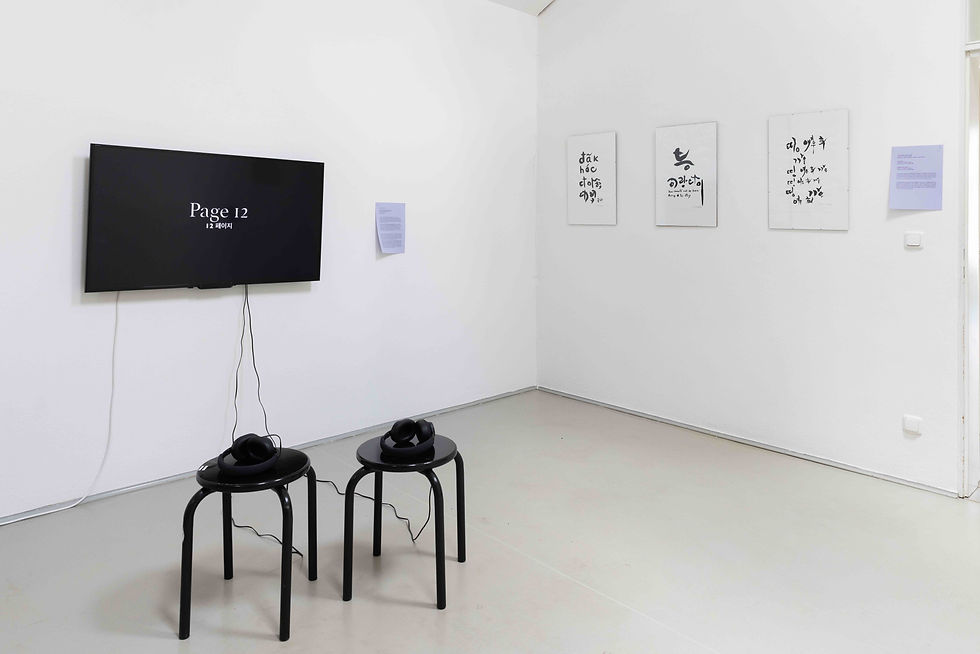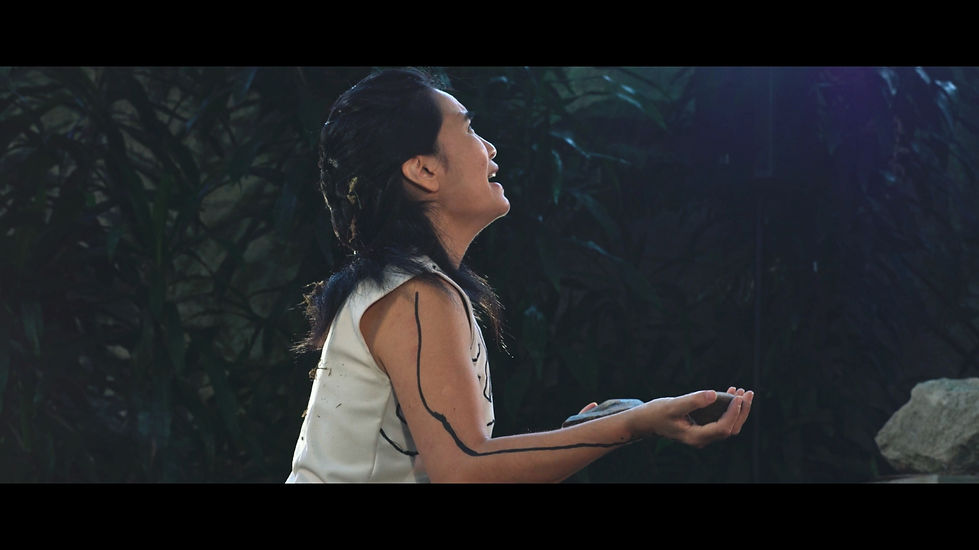Utiná,
Okinawa,
Ryukyu,
I'm a daughter of the Okinawan diaspora in Latin America and a lifetime researcher of our erased memories and counter narratives.
Stories that We Imagine,
Stories that Connect Us
(6.3.-1.6.2025)
Group exhibition with Lizza May David, Fumiko Kikuchi, Thaís Omine, Kyong Ju Park.
Curated by Kathy-Ann Tan at the Kunstverein Langenhagen

Stories that We Imagine, Stories that Connect Us
Geschichten, die wir uns vorstellen, Geschichten, die uns verbinden
with Lizza May David, Fumiko Kikuchi, Thaís Omine, Kyong Ju Park
Curated by Kathy-Ann Tan
6.3.-1.6.2025 – Kunstverein Langenhagen (Hannover)
Maya Angelou said, “There is no greater agony than bearing an untold story inside you.” The group exhibition “Stories we imagine, stories that connect us” invites us to reflect together on how stories of care and community are created, re-told and passed on amidst the ongoing realities of political conflict, social violence and polarization. How does the history of marginalization and “otherness” affect the ways in which we perceive ourselves (or not) as part of the society in which we live? How can we uncover the layers of oral and visual narratives and texts to convey stories that would otherwise be 'lost' to future generations? How can we make visible the embodied knowledge that we can share and pass on to future generations? How can we make structures of oppression and discrimination visible, not to re-center them, but to hold them accountable and embark on a path of individual and collective healing? The four artists use various multimedia works to address these questions, opening up a space for discussion, reflection and exchange.
Program
Thu, 6.3., from 7 pm
Opening of the exhibition and curatorial talk with the artists and Kathy-Ann Tan
Sun, 6.4., 4-5.30 pm
Workshop and talk with Gemeinsam leben in Langenhagen e.V. in the exhibition
Thu, 10.4., 6 pm
Reading Session (online) with Kathy-Ann and Thaís
Sat, 24.5., 6 pm
"Lan's Diary: a Lecture Performance"
Lecture Performance with Park Kyong Ju
Sun, 01.6., 6 pm
Finissage and Closing Performance with Riko Sugama
more info: Kunstverein Langenhagen




Kunstverein Langenhagen 2025. Photos by Andre Germar

O Silêncio é Muito Eloquente
(Silence Is Very Eloquent)
7 min | 2025 | HD video 3:4, color, stereo | Portuguese with English subtitles
_________The experimental film O Silêncio É Muito Eloquente emerges from Thaís’ personal archive of counter-narratives within the Okinawan diaspora in Brazil. Developed over the past seven years, her anthropological research, O Meu Gene Não é Solúvel, examines the sociopolitical context of Japanese and Okinawan immigration to Latin America in the 20th century. Over time, this research has taken on different forms, unfolding through both textual and audiovisual explorations. Grounded in decolonial praxis, Thaís interrogates the methodological challenges of researching stories where silence – rooted in trauma, humiliation, and violence – becomes an imposed norm. She further reflects on how spaces of exclusion remain peripheral within the social sciences, which, as Grace Cho suggests, have a tendency to produce “ghosts.”
Why can’t these ghosts speak, and why are they still here? What is it they so desperately want to say? Tell me–
I want to know.


Fantasma
(Ghost)
Fabric and paper installation | chiffon, gauze and silk | 300x150cm
A whisper of memory drifts between layers of chiffon and gauze, translucent as forgotten histories. The ghosts are here—not vanished, but suspended in the red threads that stitch together time, trauma, and the weight of silence.
Two films breathe through the fabric: one, an experimental murmur (O Silêncio É Muito Eloquente), seeps through delicate gauze like a half-remembered dream. It carries the unspeakable—Okinawan voices scattered across the Brazilian diaspora, their stories dissolved into silence, yet persisting as spectral traces. On the other side, Maré (2022), unfolds across white chiffon, its long tail pooling like an unfinished confession.
Between them, the US flag flickers—an archival specter—while a cartoon rat-man creeps through paper, a grotesque echo of 1908 Japanese migration to Brazil, a colonial nightmare stitched into the seams of Western sovereignty. Migration as grotesque, as infestation.
The ghosts do not whisper. They scream in the negative space, in the unspoken. Tell me—I want to know.
15. May 2024: Okinawan Reversion Day
As part of the NO TERRA NULLIUS » interdisciplinary program at SINEMA TRANSTOPIA, I co-curated this evening with my dear friend and hajichia Hiromi Toma » to make the 15. May a day to remember, reflect and fight for the right to a dignified existence of the native peoples of the Ryukyu Islands over and above imperialist and colonizing interests.

The event took place on the 14/05/2024, 19h at SINEMA TRANSTOPIA Berlin.
Curated by Thaís Omine and Hiromi Toma. Photos by Thaís Omine.
FOYER EXHIBITION:
Paper sculptures and photographies "ŪTŌTU" by Hiromi Toma
Single photography "HAJICHI" by Sugano Matsusaki
Audiovisual installation "Nas Agulhas De Costura Da Obá" by Naomi Asato
Watercolor drawings by Martin Rümmele
OPENING PERFORMANCE:
Traditional Ryukyuan Dance by Riko Sugama
Animation videos by Igor Shin
DOUBLE SCREENING:
Mud Man
Chikako Yamashiro, Japan 2017, 26 min. Uchinaaguchi, Jeju with English subtitles, digital
沖縄エロス外伝 モトシンカカランヌー (MOTOSHINKAKARANNU)
Nihon Documentarist Union, Japan 1971, 84 min. Japanese and Uchinaaguchi with English subtitles, digital
Finalizing with a ROUND TABLE to discuss the exhibited work and share insights and experiences with the audience.


Maré (Tide)
39 min | 2022 | HD, Found Footage
Portuguese with English subtitles
Directed by Thaís Omine
Silvia Naomi Asato
Lucia Kakazu
Laís Miwa Higa
Filming, Sound and Editing
Thaís Omine
Artistic Direction and Sound Mix
Catita Alves
Mentorship
Lisa Gründ
Solomon Mekonen
Kristian Petersen
Tami Libermann
Special Thanks
Hiromi Toma
Elen Ticianelli
Masako Ticianelli
Nadya Gushiken
Ellen Aiko
Renata Kawano
Patrícia Aguena
Associação Okinawa de Campo Grande
Maré (Tide) is an ethnographic documentary conceived as part of my masters research on female counter-narratives of the Okinawan diaspora in Brazil.
"Maré", tide in Portuguese, is a documentary about three young Brazilian Uchinaanchu women – Naomi Asato, Lúcia Kakazu and Miwa Higa – daughters of the Okinawan diaspora in São Paulo, Brazil. The film is a result of encounters and conversations shared with them in 2022, in which they talk about their own research and artistic practices acting as "native anthropologists" to take ownership over the colonized histories and narratives about Okinawa and the diaspora. They tell us the herstories of Utiná from the land that we now call Brasil, challenging who tells and how the stories of the diaspora are told.
The film is a complement of a wider anthropological research about the Okinawan diaspora in contemporary Brazil.
More info below.






"In the middle of a dream, I woke up in the ocean, immersed in its deafeningly deep blue waters. Of warmth in my body, only my heart that pulsed insistently. My cold body was already losing its emotions, and I almost succumbed to the coldness of the water. I was small, insignificant in the line between the water and the sky. Suddenly I saw a wave, giant and wild, forming on the stormy horizon and dragging me to the top of its crest. From up there, I could hear voices, chants, whispers that were lost in the screeching of the birds. They told me about their memories, the wounds and fragments of silence sewn into the fabric of time, into the threads of water that made up that tide. I closed my eyes and suddenly my body was the beach, the black sand that kissed feet and paws, the stones that burned with the heat of the sun. I saw the tide that carried me then rise up the shore, flooding me, filling me, overflowing me. The salt water moistened my fine dry sands, scorched the heat of the stones, came and went in a melodic rhythm that made the whole beach dance. We celebrated. The perfect symphony of the cycles of nature, our little bodies that formed that immensity, irregular and paradisiacal. The beauty of life that doesn't end, but transforms itself. The existence and the resistance that blooms from every pore and pulsates in each body native to this land."
Reflections post-filming process. October 2022

M.A. Thesis
O Meu Gene Não É Solúvel
(My gene is not soluble)
decolonial narratives from women of the Brazilian Okinawan diaspora
ABOUT THE TITLE
"The title of this research “My gene is not soluble” is an allegory to the “Políticas de Branqueamento” (“whitewashing policies”) and the myth of “racial democracy” in postcolonial Brazilian studies. The world is often thought of as being postcolonial, forcing upon us the perception of colonialism as a chapter in history that belongs to the past. It is important to reinforce that it was not left behind, but merely transformed. Colonialism remains entrenched in all kinds of structures: in our politics, relationships, minds and even bodies influencing and guiding how we see, sense, and assimilate the world around us. Brazil in particular was a laboratory for colonial practices that made it especially susceptible, as an independent republic, to scientific racism ideas from North America and Europe that tied racial purity to national cohesion and progress."
ABSTRACT
This research focuses on collecting narratives from young women of the Brazilian Okinawan diaspora, intertwining it with a narrative that has the hacer decolonial as a praxis. Like a piece of patchwork, diasporic narratives are (de)constructed looking at historical developments given as facts distorted by epistemicide. What remains are questionings that seek to open paths to othered knowledges that have as a starting point the recognition of the traumas left by colonialism in diasporic bodies.
Keywords: Brazilian Okinawa diaspora, uchinaanchus, colonial trauma, internalized racism, transgenerational haunting, decolonial practices

FINAL REMARKS
My intention with this research and this documentary was to work with othered narratives and practices regarding Okinawan immigration in Brazil. Through the plural perspectives of decolonial studies, my curiosity resonated in the process of conducting such research and artistic projects, seeking active listening and mutual exchange with my interlocutors. I would come to realize during the final elaboration of this work, that the conscious transformation triggered by decolonial work would be much more connected to the process, in the "how" one decides to do it, rather than in the final "product" one can aim for.
Nevertheless, the most gratifying aspect to notice at the end of this work is the dance that diverse and multiple knowledges can make when placed in spaces of equal respect, importance and contemplation. It's about recognizing that the colonial binarity in which "one is the negation of the other" can and must be debunked without any side effects more harmful than its very existence. It is about the recognition of positions of privilege and subalternization starting from a critical dialectic about the gaze that only goza (enjoys) at the expense of the pain of the other.
Finally, in the film "Maré" as a complement to this research, the black and white of the archival material from the Battle of Okinawa together with the photographs of Naomi's family, speak about this static and timeless place of the traumas intrinsic to the bodies of the Okinawan diaspora, which refuses to remain in the past. Throughout Lucia's dance practices, it is possible to shake these memories by means of art, which gives movement to such static images. From the critical reflection and communal contemplation proposed by Miwa, paths to emancipation from colonial traumas are opened: “it is why every decolonizing process is a self-decolonization" (Ocaña; Lopez & Conedo, 2018, p.182).
ACADEMIC SUPERVISION
Lisa Grund
Solomon Mekonen
REVISION
Jorge Vega
FIELDWORK FACILITATOR
Hiromi Toma












